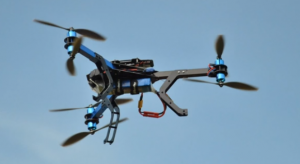from jdsupra.com
 As I stood outside of 2nd Recon Battalion Headquarters, located on the United States Marine Corps base at Camp Lejeune, I heard my name called from the inner region of the Senior Staff offices. That’s a place where you seldom want to hear your name yelled on a Friday afternoon.
As I stood outside of 2nd Recon Battalion Headquarters, located on the United States Marine Corps base at Camp Lejeune, I heard my name called from the inner region of the Senior Staff offices. That’s a place where you seldom want to hear your name yelled on a Friday afternoon.
Platoon Commander: “Thompson, get in here.”
Me: Answering with slight degree of hesitation as I entered the offices, “Yes, Gunnery Sergeant.”
Platoon Commander: “You’re going to drone school!”
Me: Slightly joking, but completely serious at the same time: “Ugh. I joined the Marine Corps so I didn’t have to use computers or technology.”
Platoon Commander: “Well, I guess you’ll have to write human resources then, won’t you? Pack your (stuff), and get out of my office!”
For some reason, my letter never reached human resources. Very soon thereafter, drones, or as they are technically called, unmanned aerial vehicles, or UAVs, became another tool in my toolbox of recon Marine surveillance equipment. Over the course of a three-week training program, I would learn how to operate and effectively employ drone assets that would eventually be used in Afghanistan.
Overseas, the military is unrestricted in its use of UAVs for routine surveillance purposes. No fourth amendment considerations are raised during battle. No search warrants need be obtained, trespassing laws are not adhered to, and nuisance laws are an afterthought — and for good reason: The dynamic of a battlefield cannot be compared to hometown U.S.A.
However, as the issue of drone use over American airspace has come to the forefront, the interaction of technology and individual privacy interests has become a major area of concern.
On one hand, if people demand overly restrictive drone laws, then development and the economic benefits of UAVs will never reach their full potential. For example, in 2007, the Federal Aviation Administration banned drones for any commercial purpose, a move, that — according to the Association for Unmanned Vehicle Systems International — has prevented $10 billion dollars of economic development each year since the FAA’s decision.
Practically speaking, there are a multitude of commercial uses for small and relatively inexpensive drones. For example, one of the biggest industries to come out on the side of being “pro drone” is the film industry. Through the use of inexpensive UAVs, ranging in price from a few hundred dollars to upwards of a thousand dollars, the film industry can capture high-angle shots that previously required weeks of setup or large payments to commercial aircraft concerns in order to capture a desired scene.
Similarly, drones offer capabilities beyond those of the human eye, and the technology can be applied to a number of different industries. Utility companies can use infrared thermal cameras on UAVs to reveal “hot spots” on transmission infrastructure that the human eye is unable to detect. Such use is not only cost effective but also reduces the chances of workers coming into contact with high voltage lines.
Recently, the FAA announced that it plans to lift the ban on commercial UAV use in 2015. However, with this announcement comes growing concern over individual citizen interests. No one wants to hear the buzz of a drone as they sunbathe poolside in the summer months.
At this juncture, the elephant in the room is what steps state and federal lawmakers will take to protect citizen privacy interests from these “eyes in the sky.”
Rest easy. Currently, 43 states including Michigan have introduced legislation addressing drones. Furthermore, in 2013, 13 states enacted laws regulating the use of UAVs.
The majority of these laws, including the proposed legislation in Michigan, serve three major goals: They define what a UAV is, they regulate drone use by law enforcement, and they prohibit misuses of UAVs through penalties and jail time.
The proposed Michigan legislation, House Bills No. 4455 and No. 4456, also goes one step further. The bills make it illegal to arm any UAV with “lethal force.” In layman’s terms, if anyone decides to strap something that goes “boom” or “bang” to a drone, they are looking at some serious jail time.
The Michigan legislation also has a provision that directly protects individual privacy interests. Section five of House Bill No. 4455 states: “Information acquired about a person through operation of a UAV shall not be disclosed” without that person’s consent.
So go ahead and relax poolside and soak in the rays. No one should be taking a video of you and selling it to TMZ without your approval.
Like many technological developments derived from warfare, such as GPS, radar, microwave ovens, duct tape and even cargo pants, drones serve too many practical uses for them to be limited to a battlefield environment. UAV technology is evolving, and it is a positive technology.
However, people have legitimate privacy interests associated with these advancements in stateside drone operation. Michigan, like many other states, has taken proactive steps to ensure that commonsense laws are in place to protect people’s privacy and foster future drone development.
Continue Reading at jdsupra.com…
Alan is serial entrepreneur, active angel investor, and a drone enthusiast. He co-founded DRONELIFE.com to address the emerging commercial market for drones and drone technology. Prior to DRONELIFE.com, Alan co-founded Where.com, ThinkingScreen Media, and Nurse.com. Recently, Alan has co-founded Crowditz.com, a leader in Equity Crowdfunding Data, Analytics, and Insights. Alan can be reached at alan(at)dronelife.com







Leave a Reply